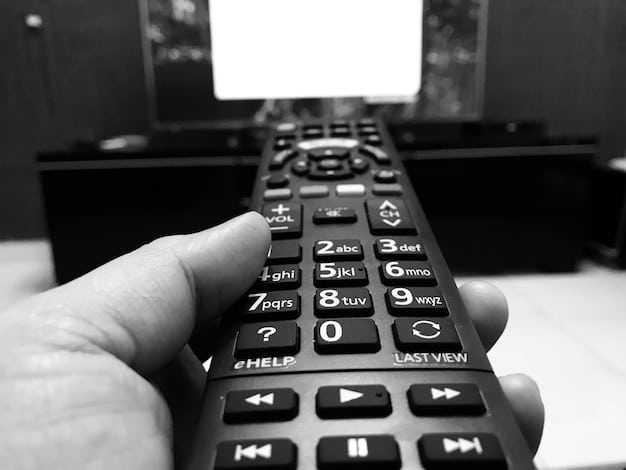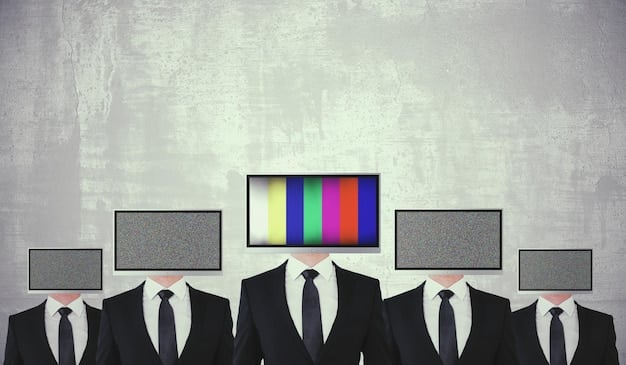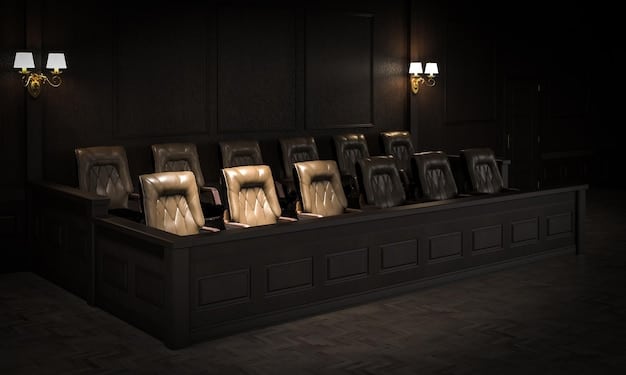Reality TV’s Courtroom Drama: Copyright, Defamation, and Control

Reality TV’s Legal Battles: Copyright, Defamation, and the Fight for Control delves into the complex legal landscape of reality television, exploring copyright disputes, defamation lawsuits, and the producers’ struggle to maintain control over their productions.
The world of reality television, often perceived as unscripted and spontaneous, is surprisingly rife with legal battles. Reality TV’s Legal Battles: Copyright, Defamation, and the Fight for Control encompass a range of issues, from protecting creative rights to managing the fallout from controversial on-screen behavior.
Copyright Infringement in Reality TV: Protecting Ideas
Copyright law plays a crucial role in the realm of reality television. It safeguards the original creative works of producers, networks, and other stakeholders from unauthorized use or replication. Understanding copyright in this context involves recognizing what aspects of a show are protectable and how those protections are enforced.
What Can Be Copyrighted in Reality TV?
Copyright protection generally extends to the unique elements of a reality show, such as its format, specific challenges, set designs, and original music. However, facts and ideas themselves are not copyrightable; only their expression is protected.
Notable Copyright Cases
One high-profile case involved claims of copyright infringement against the producers of “Keeping Up with the Kardashians.” A similar reality show producer alleged that the Kardashian show copied numerous elements from her show. These cases highlight the importance of originality and the potential legal risks of closely mirroring existing formats.

- Format Protection: Producers should copyright unique show formats to prevent unauthorized replication.
- Original Content: Copyright all original content, including music, graphics, and set designs.
- Due Diligence: Conduct thorough research to ensure your show doesn’t infringe on existing copyrights.
Copyright disputes are common in reality television, requiring creators to be proactive in protecting their intellectual property. These battles underscore the significance of understanding and adhering to copyright laws to avoid costly litigation and maintain creative control.
Defamation Lawsuits: When Reality Hurts
Defamation, which includes both libel (written defamation) and slander (spoken defamation), can be a major legal hazard for reality TV productions. The genre’s reliance on drama and interpersonal conflict often leads to statements that can be construed as damaging to someone’s reputation. Navigating defamation laws in reality TV requires a careful balance between entertainment and legal responsibility.
Understanding Defamation
To win a defamation case, a plaintiff must prove that a statement was false, published to a third party, caused injury to their reputation, and, in some cases, made with malice. Public figures, including reality TV stars, often face a higher burden of proof, as they must demonstrate actual malice—that the statement was made with knowledge of its falsity or with reckless disregard for the truth.
Real-Life Defamation Cases
Several reality TV stars have been involved in defamation lawsuits. One notable case involved a “Real Housewives” cast member who was accused of making false statements about another cast member. These lawsuits underscore the importance of vetting potentially defamatory statements before they air.

- Fact-Checking: Implement rigorous fact-checking processes to verify potentially defamatory statements.
- Legal Review: Have legal counsel review episodes before they air to identify potential defamation risks.
- Insurance: Maintain adequate insurance coverage to protect against potential defamation claims.
Defamation lawsuits can be costly and damaging for reality TV productions. Producers must exercise caution and implement robust risk-management strategies to mitigate the risk of defamation claims and protect their shows and stars from legal fallout.
Contract Disputes: Power Dynamics and Enforceability
Contracts are the backbone of reality television, governing the relationships between producers, networks, and participants. These agreements outline the rights, obligations, and expectations of each party, including compensation, confidentiality, and control over footage. Contract disputes often arise due to power imbalances and questions of enforceability.
Key Contractual Elements
Reality TV contracts typically cover a wide range of issues, including appearance releases, confidentiality agreements, and intellectual property rights. These contracts often grant producers significant control over participants’ images, stories, and personal information. Disputes can arise when participants feel that their rights have been violated or that they have been unfairly portrayed.
Challenges to Contract Enforceability
Courts may refuse to enforce contracts that are deemed unconscionable or that violate public policy. Factors such as unequal bargaining power, lack of legal representation, and oppressive terms can lead to challenges to contract enforceability. Participants who allege that they were coerced or misled into signing a contract may also have grounds to challenge its validity.
- Independent Counsel: Encourage participants to seek independent legal advice before signing contracts.
- Fair Terms: Ensure that contracts are fair, reasonable, and clearly understood by all parties.
- Mediation: Consider alternative dispute resolution methods, such as mediation, to resolve contract disputes.
Contract disputes can be contentious and time-consuming for all parties involved. Producers should strive to create contracts that are fair, transparent, and legally sound to minimize the risk of disputes and maintain positive relationships with participants.
Privacy Rights: Balancing Public Interest and Personal Boundaries
Privacy rights are a significant concern in reality television, where participants often expose intimate details of their lives to a wide audience. Balancing the public’s interest in entertainment with individuals’ rights to privacy requires careful consideration and legal compliance. In the United States, privacy laws are varied and complex, often differing by state.
Navigating Privacy Laws
Reality TV productions must comply with federal and state privacy laws, which may restrict the collection, use, and disclosure of personal information. These laws may require informed consent from participants before their private information is shared. Producers should also be mindful of laws relating to wiretapping, eavesdropping, and the use of hidden cameras.
Invasion of Privacy Claims
Participants who believe that their privacy has been violated may bring lawsuits against producers for invasion of privacy. These claims may be based on theories such as intrusion upon seclusion, public disclosure of private facts, or false light. To avoid these claims, producers should obtain clear and informed consent from participants and respect their reasonable expectations of privacy.
- Informed Consent: Obtain clear and informed consent from participants before filming or disclosing private information.
- Privacy Policies: Develop and implement comprehensive privacy policies that comply with applicable laws.
- Sensitive Content: Exercise caution when filming or airing sensitive content, such as medical or financial information.
Privacy rights are a critical consideration for reality TV productions. Producers must adhere to legal standards and ethical principles to protect participants’ privacy while providing compelling entertainment for viewers. A strong commitment to privacy can help avoid costly litigation and preserve the integrity of the show.
Intellectual Property Rights and the Digital Age
In the digital age, intellectual property rights in reality television extend beyond traditional copyright and trademark protections. Producers must also navigate issues such as unauthorized online distribution, social media usage, and fan-created mashups. Protecting intellectual property in the digital realm requires a multifaceted approach that combines legal strategies with technological solutions.
Digital Copyright Challenges
The internet has made it easier than ever for unauthorized copies of reality TV episodes to be distributed online. Producers must actively monitor online platforms for copyright infringement and take steps to remove infringing content. The Digital Millennium Copyright Act (DMCA) provides a legal framework for addressing online copyright infringement, but enforcement can be challenging.
Social Media and Fair Use
Social media platforms present both opportunities and challenges for reality TV productions. Participants and fans may create derivative works, such as memes and mashups, that incorporate copyrighted content. While some of these uses may qualify as fair use, others may constitute copyright infringement. Producers must carefully balance their desire to protect their intellectual property with the need to engage with fans and promote their shows.
- Digital Monitoring: Invest in digital monitoring tools to detect and address online copyright infringement.
- DMCA Compliance: Comply with the DMCA by promptly responding to takedown notices and addressing repeat infringers.
- Fan Engagement: Develop strategies for engaging with fans while protecting intellectual property rights.
The digital age has transformed the landscape of intellectual property law for reality television. Producers must stay abreast of emerging technologies and legal developments to effectively protect their creative works and maintain control over their brand.
The Future of Legal Battles in Reality TV
As reality television continues to evolve, so too will the legal challenges facing producers, networks, and participants. Emerging technologies, changing social norms, and increasing scrutiny from regulators and advocacy groups are likely to shape the future of legal battles in the genre. Staying ahead of these trends will require a proactive and adaptive approach to risk management and legal compliance.
Emerging Legal Issues
One emerging issue is the potential for liability arising from the mental health impact of reality TV participation. Participants may experience stress, anxiety, and depression as a result of their on-screen experiences, leading to potential lawsuits against producers for negligence or intentional infliction of emotional distress. Another issue is the use of artificial intelligence (AI) in reality TV production, which could raise concerns about copyright, privacy, and algorithmic bias.
Best Practices for Legal Compliance
In the future, reality TV productions will need to adopt even more rigorous best practices for legal compliance. These practices may include conducting comprehensive psychological evaluations of participants, providing ongoing mental health support, and implementing ethical guidelines for the use of AI. Producers will also need to stay informed about changes in the law and adapt their policies accordingly.
- Mental Health Support: Provide comprehensive mental health support for participants, both during and after filming.
- Ethical AI Use: Develop and implement ethical guidelines for the use of AI in reality TV production.
- Continuous Learning: Stay informed about changes in the law and adapt policies accordingly.
The future of legal battles in reality television will be shaped by a complex interplay of legal, ethical, and technological factors. Producers who prioritize legal compliance, protect participants’ rights, and embrace innovation are best positioned to thrive in this dynamic and ever-evolving industry.
| Key Concept | Brief Description |
|---|---|
| 🎬 Copyright | Protects original show formats and content. |
| 🗣️ Defamation | False statements harming someone’s reputation. |
| 📝 Contracts | Agreements between producers and participants. |
| 🔒 Privacy | Rights of individuals to control their personal information. |
FAQ
▼
Unique elements like the show’s format, specific challenges, set designs, and original music are protected by copyright. Ideas themselves cannot be copyrighted, only their expression.
▼
Defamation involves false statements published to a third party that cause harm to someone’s reputation. Proving defamation requires demonstrating the statement was false and caused injury.
▼
Contracts govern the relationship between producers, networks, and participants, outlining rights, obligations, and expectations. They cover compensation, confidentiality, and the use of participants’ images.
▼
Participants have rights to privacy, which producers must respect by obtaining informed consent before filming and sharing private information. Laws vary by state regarding the collection and use of personal data.
▼
The digital age brings challenges like unauthorized online distribution and social media use of copyrighted content. Producers must monitor online platforms and address infringement effectively.
Conclusion
Understanding reality TV’s legal battles: copyright, defamation, and the fight for control is crucial for all stakeholders involved in the industry. By focusing on ethical practices, clear contracts, and respect for privacy alongside awareness of digital pitfalls, responsible television production can create captivating content while minimizing legal risks.





